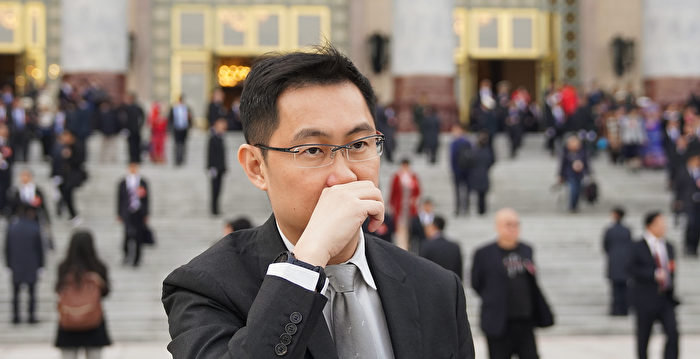[The Epoch Times, March 27, 2022](The Epoch Times reporter Winnie interviewed and reported) Recently, Tencent released its fourth quarter and full year financial report for 2021. Its revenue in the fourth quarter increased by 8% year-on-year, and the company went public in 2004. Net profit (Non-IFRS) fell by 25% year-on-year, the lowest ever recorded, and annual net profit (Non-IFRS) increased slightly by 1% year-on-year, the lowest annual growth rate in nearly a decade.
Tencent President Liu Chiping said at an earnings conference on the evening of March 23 that hiring of new employees will slow this year. Tencent founder, chairman and CEO Ma Huateng reminded employees how to “spend the winter”.
Mike Sun, an investment strategy expert in North America and an expert on China issues, told The Epoch Times that due to the influence of the CCP’s regulatory policies, Internet companies listed on U.S. and Hong Kong stocks last year suffered from waterloo, and Tencent Holdings was no exception. Tencent’s stock fell to HK$400 in late August 2021. (about 52 US dollars) mark, last week, Hong Kong stocks fell below 300 Hong Kong dollars (about 39 US dollars).
Since April 2017, Tencent has entered the list of the top 10 companies with the largest market capitalization in the world. Affected by the CCP’s regulatory policies, it began to decline in the second half of last year and fell off the list in September last year. In February this year, with the rebound in market value, Tencent re-entered the ranks of the top 10 companies, ranking 10th.
Tencent’s advertising business grew strongly in the first half of last year, but revenue slowed sharply in the second half due to the CCP’s regulatory environment. Online advertising revenue fell 13% year over year in the fourth quarter. Among them, social advertising revenue fell by 10%, and media advertising revenue fell by 25%. The main reason is that many advertisers come from industries such as education, games and the Internet, which are greatly affected by regulation.
For the whole of last year, Tencent’s online game revenue increased by 12% year-on-year, a decrease of 24% from the increase in 2020 (36%). Although its overseas market performance was impressive last year, and its international game revenue increased by 31%, its domestic game revenue only increased by 6%. In the fourth quarter, its domestic game revenue increased by 1% year-on-year, and it showed a negative growth of 12% month-on-month.
China Economic Observation Network reported that since last year, the game version number has not been issued for more than 8 months, which has a great impact on the game industry. In September last year, the government strengthened the protection and supervision of minors, which also had a significant impact on the game industry, resulting in a decline in Tencent’s local game revenue in the fourth quarter.
In mid-March, Reuters, citing sources, reported that Tencent plans to lay off employees in some business units this year, including 10% to 15% in divisions responsible for video streaming and search.
Tencent President Liu Chiping did not respond positively to the question of whether there will be layoffs at the financial report briefing, but he euphemistically said that the total number of employees will still grow in 2022, non-core businesses will be streamlined, and new employee recruitment will slow down. Tencent will add more than 26,000 employees in 2021.
Peng Mei News reported on March 15 that Tencent’s internal employees revealed that some business groups are indeed being optimized, but not all departments are laying off employees, and some positions are still being recruited externally.
Ma Huateng, founder of Tencent, mentioned the issue of how to “spend the winter” at the meeting. He said that there are two points to consider when spending the winter. One is to adjust the posture. Due to changes in the external environment, “cost reduction and efficiency increase”, and bullets are used in key battles; the second is to strengthen internal cooperation, rather than fighting alone. Typical An example is the integration of the three SaaS products of Enterprise WeChat, Tencent Meeting and Tencent Documents.
Ma Huateng also said that in the face of industry challenges, Tencent will actively embrace changes, reduce costs and increase efficiency, focus on key strategic areas, and strengthen long-term sustainable development measures.
It is worth mentioning that although Tencent was also hit by Beijing’s regulatory storm, it was not punished by the authorities with a huge fine of up to 18.228 billion yuan ($2.78 billion) on antitrust grounds like Alibaba.
In this regard, Mike Sun said that unlike Alibaba’s founder Jack Ma, who “likes to challenge the CCP and is a high-profile person”, Ma Huateng actively moved closer to the CCP, and he was also very low-key, which was an important reason why Tencent was able to avoid a bigger blow.
Ma Huateng is accused of frequently courting the CCP. For example, in June 2018, Ma Huateng and JD.com boss Liu Qiangdong went to Yan’an, the birthplace of the CCP, to take a “ideological class”, while wearing the CCP’s Eighth Route Army uniform; Ma Huateng said at the staff meeting at the end of last year that Tencent is just an ordinary company, and it can be used at any time. If it is replaced, Tencent will be “not missing”, “not offside” and so on.
Despite this, Mike Sun believes that Tencent’s prospects are bleak under the background of the CCP’s continued regulatory policies and the accelerated outflow of foreign capital from China and Hong Kong.
Responsible editor: Lian Shuhua #
